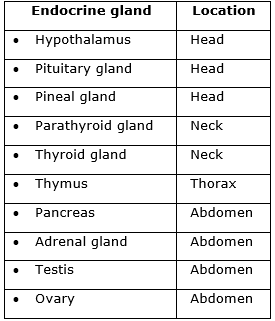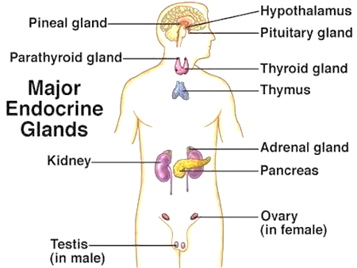Name the endocrine glands and their location in the human body. Describe any two of them in detail.

Location of various endocrine glands can be better understood by the following diagram:

Ovary- This endocrine gland is present only in females and secretes female sex hormones Oestrogen and progesterone.
These are two in number and are present in the abdominal cavity. They also produce eggs.
Functions of oestrogen-
● It causes the growth of the female reproductive organs- There is growth in the size of the uterus, vagina, and fallopian tubes.etc.
● It is also responsible for the growth of the breasts.
● It is responsible for the feminine characteristics.
● It is responsible for the pubic and axillary hair growth in females and does not cause dense hair growth as males have.
● It is responsible for the soft skin of women.
● It is also responsible for the high pitch voice in females.
Functions of Progesterone-
● It also regulates the growth of the breasts in females.
● It helps in regulation of the menstrual cycle in females.
● It also helps in maintaining pregnancy in females.
Pancreas- This is a dual gland which exhibits both endocrine and exocrine nature. It is present in the abdomen. The endocrine part of the pancreas is islets of langerhens. There are two hormones secreted by pancreas called insulin and glucagon. Insulin is secreted by the beta cells and glucagon is secreted by the alpha cells of the islets of langerhens. Both insulin and glucagon regulate the blood glucose level.
Functions of Insulin-
● It maintains the blood sugar level by converting extra glucose into the glycogen which is stored in liver cells.
● Whenever there is enough amount of glucose present in the body insulin prevents more synthesis of glucose by preventing the breakdown of carbohydrates and thus maintains blood glucose level.
Functions of glucagon-
● It maintains blood sugar level by converting glycogen into the glucose whenever there is a deficiency of glucose.
● It prevents synthesis of glycogen and promotes breakdown of carbohydrates whenever there is deficiency of glucose in blood level.
So, according to the level of glucose in the blood secretion of insulin and glucagon regulates the normal blood glucose level i.e. 80-120 mg/dl of blood.
Deficiency of insulin leads to excess blood glucose level and causes disease Diabetes Mellitus.